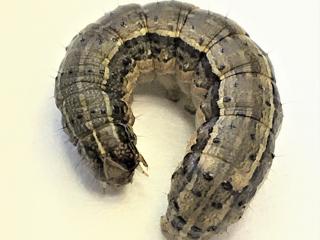Fall armyworm update
The exotic pest fall armyworm (FAW), Spodoptera frugiperda, was first detected in Western Australia in Kununurra, in the Kimberley region, in March 2020. It has also since been found in several locations around Broome, then at Carnarvon.
Since the discovery of a single male FAW moth in a DPIRD trap at Moonyanooka in mid-July there have been no further FAW moth detections in the 70 plus FAW traps located throughout the WA grainbelt.
There has also been no FAW caterpillar detections in the WA grainbelt to date.
Growers and consultants are urged to continue being vigilant and checking for this new pest when monitoring cereal, canola and pulse crops for pests up until harvest.
For tips on identifying FAW refer to DPIRD’s 2020 PestFax Issue 14 How to distinguish Fall armyworm caterpillars from other endemic caterpillars article and How to identify fall armyworm video
What should you do if you suspect you have found FAW?
If you find a caterpillar that you suspect to be FAW please collect a sample. Place the caterpillar into boiling water for approximately 5 minutes as this denatures enzyme activity. Then place the caterpillar into 70% ethanol or methylated spirits and contact DPIRD entomologist Dusty Severtson on +61 (0)427 196 656 to arrange for identification.
You can also take clear close-up photos of the caterpillar and plant damage and submit a report using the MyPestGuide Reporter app or contact DPIRD’s Pest and Disease Information Service (PaDIS) by email or phone +61 (0)8 9368 3080. Samples may then be requested as the only way to make a definitive identification for FAW is from examining a physical specimen under a microscope. DPIRD entomologists cannot make a definitive identification from images, but they do help to narrow it down and rule them out as other species.
For more information on FAW refer to DPIRD’s:
- Fall Armyworm in Western Australia page
- Fall armyworm larval identification guide fact sheet
- 2020 PestFax Issue 10 Fall armyworm detected in the WA grainbelt article.
For more information contact Dustin Severtson, Research scientist, Northam on +61 (0)427 196 656.
Article authors: Dusty Severtson (DPIRD Northam) and Cindy Webster (DPIRD Narrogin).


